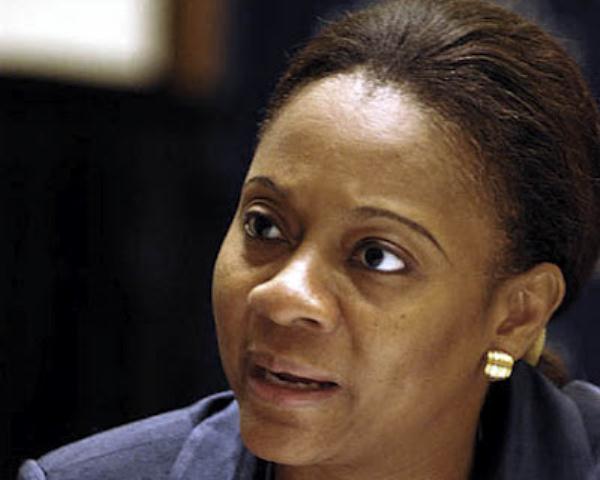Arumah Oteh rode to the capital market on the crest of a crisis that engulfed it between 2008 and 2009. Her arrival in January 2010 heralded a shake up that uprooted Ndi Okereke-Onyiuke as Nigerian Stock Exchange (NSE) Director General.
Her undisguised mission was to restore sanity in an equities market that turned into a haven for graft and underhand dealings. And she announced this much to a complicit NSE and the dealing members and pursued it with an uncompromising stance and vigour.
Thus under Oteh’s leadership of the Securities and Exchange Commission (SEC), it championed reforms in the NSE which witnessed a more robust output and delivery in its operator and oversight role.
Five years on, the reformer has quit the market after a failed bid to secure another tenure of five years because of a crisis of confidence and web of controversy.
Oteh handed over to SEC Executive Director (Operations), Muirnir Gwarzo, to the jubilation of the capital market community, especially the SEC staff.
The wild jubilation was expected, given the frosty relationship between her and operators on the one hand, and many SEC employees on the other hand.
She was a greenhorn up against NSE and market operators who manipulated share prices out of proportion that in less than five years, the equities market grew by over 500 per cent, and by 2008 the bubble could no longer be sustained.
When the bubble eventually burst in May 2008, local investors lost about N6 trillion.
They had been carried away by the stock market euphoria exacerbated by banking industry recapitalisation and consolidation between 2005 and 2007.
The colossal loss gave rise to a festering apathy to equities investment by citizens who blamed the crash and the losses on regulatory slumber, graft, and insider deals rife among operators.
It was against this background that Oteh came from African Development Bank (AfDB) to head the SEC. She stormed the NSE in August 2010 unannounced, and removed Okereke-Onyiuke and other senior management staff.
World class market agenda
Oteh announced a strong resolve to implement sweeping reforms to lift the market and re-position it among leading capital markets that meet international standards and best practices.
She said the SEC would adopt 32-point recommendations of a I5-man National Committee on Review of Capital Market Structure and Processes established at the instance of the SEC in September 2008.
The recommendations articulated the reforms needed to raise the capital market out of the doldrums and lay foundation for key issues to be undertaken by the SEC under her watch.
She noted then that a well-functioning capital market was essential to Nigeria’s economic development, and to realise its full potential, the country must have a world class capital market that is strong, sustainable, effective, and plays a central role in economic development.
“First of all,” Oteh stressed, “we have to increase the depth, breadth and sophistication of the market. There are a limited number of asset classes as the market is dominated by equity investments.
“Therefore, we need to expand market offerings to include products such as fixed income securities. Hedging instruments such as futures and other derivatives need to be promoted as well as securities lending and Collective Investment Schemes.”
She sought to strengthen oversight, improve regulation, oversight and supervision, and also fortify the SEC with human capacity.
Good corporate governance by full disclosure, transparency and accountability were also key issues she sought to address, in order to restore confidence and integrity.
She emphasised the naming and shaming of errant operators.
Equities market before Oteh
Dipo Aina, Managing Director of Signet Investments and Securities, once recounted the malpractices prevalent in the stock market leading up to the bubble burst and crash in 2008.
“Years 2006 and 2007 witnessed an upsurge in private placements which were mostly oversubscribed when eventually listed by introduction on the [NSE]. The private placements and Initial Public Offers (IPOs) were mostly financed by bank loans and margin accounts,” he recalled.
“These offers were ushered in by a lot of media hype and razzmatazz. Unofficial secondary markets were created for these private placements and they actually sold at premium even before listing them at the Exchange. All these malpractices were very prevalent in the market.
“The [NSE] witnessed unprecedented price movement, which translated to high market capitalisation and index.
“Some of the moribund companies witnessed significant movements in their prices; it was an era when the Nigerian investor was willing to buy any stock in the market, no matter how weak the fundamentals of the companies are. It was our era of irrational exuberance.”
Before Oteh’s arrival, stock brokerage firms connived with banks to manipulate share prices and distort the market. One single stock brokerage firm had access to over N90 billion margin loan from banks.
Today, all these are a thing of the past as both the SEC and NSE have exercised efficiently their regulatory roles to stem the sharp practices.
Expanding market breadth
The National Committee on Review of Capital Market Structure and Processes, instituted in September 2008, concluded that the market was short of the pace and development of product offerings seen in other emerging markets.
The committee recommended
• Expansion of market products and offerings by including fixed income products, mutual funds, OTC market, REITS, derivatives, and by encouraging non-financial services to list on the NSE.
• Enhancing debt/fixed income market be put in place.
• Demutualisation of the Exchange to guarantee full disclosure and increased transparency in the market place.
• In other words, the Exchange should cease to be a private sector business owned and operated by a few individuals, a status that predisposes the market to abuses.
The NSE initially drew a programme to demutualise, but it never got off the ground as contrasting individual interests overwhelmed regulators and operators alike.
Now, more products are being introduced in the market – Islamic Finance, for instance – against plans by the former NSE leadership that no expansion could be effective without government support through market-friendly legislation.
REITs, OTC, Collective Investment Schemes (CIS), and several other products have been introduced into the market regardless of operators’ competence.
Capital formation and intermediation
The capital intermediation role of the market was skewed in favour of the services sector against the real sector. The SEC, NSE as well as other stakeholders know this much and desired to redirect the trend by encouraging manufacturers to raise funds through the capital market.
States were also encouraged to access funds to build infrastructure.
The objective was to connect the capital market to the larger economy to improve infrastructure and, especially, to propel the real sector.
Postmortem
Five years later, Oteh’s sojourn left mixed feelings among stakeholders. Most operators said she left the market worse off, but the SEC insisted that her accomplishments stand out.
A statement the SEC issued to announce her departure said she “will certainly be remembered for rescuing the capital market from the doldrums in which it was mired as a result of sharp practices that were rife and the global financial crisis, soon after she assumed office in January 2010.
“From a market capitalisation of N4.99 trillion in January 2010 and through a therapy of reform measures catapulted the NSE capitalisation to its peak of over N14 trillion in 2014.
“The Nigerian stock market, which rose by 35 per cent in 2012 and a further 47 per cent in 2013, was also among the 10 best performing markets in the world that same year.
“Even though by end 2014, the NSE capitalisation had regressed to N11.5 trillion on account of the combined macroeconomic forces of dwindling confidence in the Nigerian capital market …. even the most pessimistic observer would agree that the fundamentals of the market bequeathed by Oteh remain significantly sound.
“She has also left behind strong market institutions and a strong SEC Nigeria.”
The statement drew a long list of achievements credited to Oteh and claimed that through strong enforcement actions and improvement of regulation, and investor education, she restored investor confidence and market integrity through zero tolerance for rules infraction, and established the National Investor Protection Fund.
The market has witnessed significant product innovation, improved listing rules, landmark bond market reforms and many more, the statement said.
“The SEC, under her leadership, strengthened disclosure requirements and spearheaded the implementation of international financial reporting standards for listed companies.
“As far back as 2011, under Oteh’s leadership, the SEC published a new code of corporate governance for the Nigerian markets which was aimed at standards improvement in line with international best practice.
“In addition to a significant improvement in corporate governance, the code is now mandatory. The SEC’s role in revamping corporate governance at Ecobank Transnational Incorporated (ETI) was globally recognised.”
The SEC added that Oteh provided direction on the role of the capital market as an enabler of socio-economic development, an efficient mechanism for capital allocation, and for fostering meritocracy in the economy, and ultimately peace and prosperity in the society through efficient resource allocation.
Her passion in seeing the Nigerian market become a world class one and the fulcrum of socio-economic development informed her leading a marketwide effort which culminated in the launch of the 10 year-capital market master plan in November 2014.
The master plan is a strategic architecture for repositioning the Nigerian capital market as one of the best and biggest globally within the envisaged timeframe, re-focus the market, and help double its size over time and grow the economy.
“The role and reputation of the Nigerian capital market in the international arena was significantly enhanced through SEC Nigeria’s greater visibility and contribution in international regulatory fora like the International Organisation of Securities Commissions (IOSCO) and its Africa and Middle East Regional Committee (AMERC).
“In both organisations, Arunma Oteh played influential roles in their highest decision making echelons. The spike in the SEC’s reputation and renown has made both the apex regulator as well as Oteh serial winners of awards and laurels bestowed by local and foreign organisations,” the statement added.
Analysts react
Lambeth Trust & Investment Company Managing Director and Chief Executive Officer, David Adonri, said it was time capital market regulators deliberately promoted the financing of the productive real sector.
Over the years, he argued, capital formation through the Nigerian capital market has largely favoured the services sector.
According to him, the capital market is unable to aggregate capital sufficient in volume and appropriate in time and cost to fund long term capital requirement.
He noted that the SEC has seen the need for a paradigm shift that would transform the economy into an industrial base.
“But then, market regulators must now strategically redirect capital formation to the strategic area of heavy industrial development. Why the real sector is underperforming in the economy is the absence of an engineering infrastructure.
“The capital that should now be formed in the market should be more strategically channeled towards developing Nigeria’s engineering infrastructure. And this engineering infrastructure is derived from a heavy industrial base,” Adonri stressed.
The heavy industrial base includes the metallic industry which comprises iron and steel and other non-ferrous metal, power, and energy. But these sectors are under the control of the government which has no plans to liberalise them.
He added: “It is the underdevelopment of these three key heavy industries that have denied the country engineering infrastructure that is required to drive light industrial production in a sustainable manner and also other heavy activities.
“So the process of capital formation should now become even more strategic and should be geared mainly towards financing heavy industrial base.”
Okechukwu Unegbu, another dealing member of the NSE, said the government has no choice but to liberalise energy and steel, just as it is trying to do with power, to stimulate industrial growth.
He insisted, however, that the capital market cannot single-handedly move the economy forward, no matter how far-reaching its reforms.














